Posted on July 20, 2023
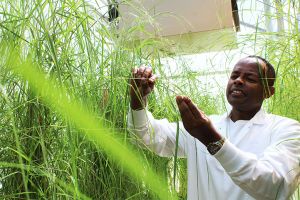 Research in the Osena Lab focuses on fundamental questions about food security as the global population approaches a projected total of 9.8 billion by 2050, necessitating an increase in cereal production by 50%. Enhancing crop productivity under the increasing impact of climate change is a great challenge as micronutrient deficiency, also called ‘hidden hunger,’ affects a third of the world population and about 30% of the U.S. population. Most of our calories come from three major cereals: rice, maize, and wheat; all are poor in essential micronutrients. Underutilized crops such as tef (Eragrostis tef) are resilient to climate change and marginal soils, rich in macro and micronutrients and proteins, gluten-free, and possess functional phytochemicals. Such ‘orphan crops’ have great potential to address global food insecurity in the face of global change. My overarching research goal is to develop crop plants that are nutritious, high-yielding, and resilient to abiotic and biotic stresses using molecular genetic tools.
Research in the Osena Lab focuses on fundamental questions about food security as the global population approaches a projected total of 9.8 billion by 2050, necessitating an increase in cereal production by 50%. Enhancing crop productivity under the increasing impact of climate change is a great challenge as micronutrient deficiency, also called ‘hidden hunger,’ affects a third of the world population and about 30% of the U.S. population. Most of our calories come from three major cereals: rice, maize, and wheat; all are poor in essential micronutrients. Underutilized crops such as tef (Eragrostis tef) are resilient to climate change and marginal soils, rich in macro and micronutrients and proteins, gluten-free, and possess functional phytochemicals. Such ‘orphan crops’ have great potential to address global food insecurity in the face of global change. My overarching research goal is to develop crop plants that are nutritious, high-yielding, and resilient to abiotic and biotic stresses using molecular genetic tools.
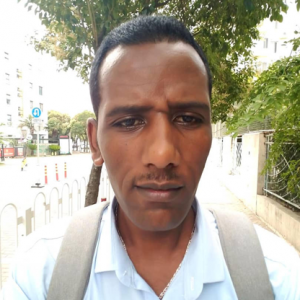 Abreham Alemu joined Dr. Osena’s lab as a new PhD student in August 2022. He is studying the role of drought-tolerant signature genes in gluten free tef (Eragrostis tef) using bioinformatics and functional genomics tools. Drought is one of the main abiotic stresses that drastically affects crop production and productivity across the globe. “My ultimate goal is to generate drought-resilient tef and rice by modern biotechnological approaches.” Alemu says that Dr. Osena’s lab gave him an incredible opportunity to work on one of the healthiest and nutrition-rich, yet underutilized, ancient crops of Ethiopia. “I thank Dr. Osena for being very supportive in helping me find the right career path that fits my interests and dream. I am very grateful to UNCG (home away from home) for accepting my application and allowing me to join the variant faculties.”
Abreham Alemu joined Dr. Osena’s lab as a new PhD student in August 2022. He is studying the role of drought-tolerant signature genes in gluten free tef (Eragrostis tef) using bioinformatics and functional genomics tools. Drought is one of the main abiotic stresses that drastically affects crop production and productivity across the globe. “My ultimate goal is to generate drought-resilient tef and rice by modern biotechnological approaches.” Alemu says that Dr. Osena’s lab gave him an incredible opportunity to work on one of the healthiest and nutrition-rich, yet underutilized, ancient crops of Ethiopia. “I thank Dr. Osena for being very supportive in helping me find the right career path that fits my interests and dream. I am very grateful to UNCG (home away from home) for accepting my application and allowing me to join the variant faculties.”
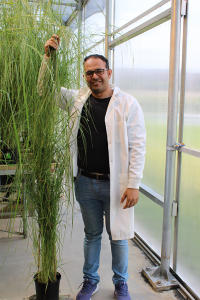 Muhammad Numan joined the Osena lab as a PhD student in the spring of 2021 in the wake of the Covid-19 pandemic. His research focuses on plant biotechnology and Molecular Biology. For his PhD dissertation, he is investigating the mechanism of iron uptake and transport in the iron-rich ancient African crop tef (Eragrostis tef) and then using the mechanism of tef to improve iron content in major cereal crops such as rice. The ultimate goal of his research is to improve the iron levels in major cereal crops to reduce iron deficiency anemia. “In Dr. Osena’s lab, I can enhance my research skills in plant biotechnology techniques, such as cloning and transforming genes into plants using agrobacterium and polish my other research and writing skills. I am thankful to Dr. Osena, who is always available whenever I need help with research. I am very grateful to UNCG, which allowed me to study in a diverse and friendly environment.”
Muhammad Numan joined the Osena lab as a PhD student in the spring of 2021 in the wake of the Covid-19 pandemic. His research focuses on plant biotechnology and Molecular Biology. For his PhD dissertation, he is investigating the mechanism of iron uptake and transport in the iron-rich ancient African crop tef (Eragrostis tef) and then using the mechanism of tef to improve iron content in major cereal crops such as rice. The ultimate goal of his research is to improve the iron levels in major cereal crops to reduce iron deficiency anemia. “In Dr. Osena’s lab, I can enhance my research skills in plant biotechnology techniques, such as cloning and transforming genes into plants using agrobacterium and polish my other research and writing skills. I am thankful to Dr. Osena, who is always available whenever I need help with research. I am very grateful to UNCG, which allowed me to study in a diverse and friendly environment.”
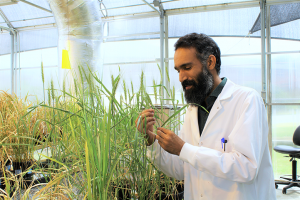 Raza Ullah is a third year PhD candidate in the Osena lab. He joined Dr. Osena’s research group in spring 2021 to pursue his research interests regarding environmental contamination and its mitigation. Raza is currently working under the USDA-NIFA grant to understand the role of microplastics in persistence and bioavailability of antimicrobials in agricultural soil that are irrigated with treated wastewater. He is using rice and lettuce as model plants to decipher the molecular responses of plants, overall crop performance, and to study the effect on soil microbial communities. He also aims to find the best management strategies to reduce the risk of antimicrobial accumulation in edible crop plants. “Dr. Osena has been an inspiring mentor, who also keeps me on track and supports me with his valuable guidance throughout my project. He always motivates me to pursue my interests and emerge as good researcher in my field.”
Raza Ullah is a third year PhD candidate in the Osena lab. He joined Dr. Osena’s research group in spring 2021 to pursue his research interests regarding environmental contamination and its mitigation. Raza is currently working under the USDA-NIFA grant to understand the role of microplastics in persistence and bioavailability of antimicrobials in agricultural soil that are irrigated with treated wastewater. He is using rice and lettuce as model plants to decipher the molecular responses of plants, overall crop performance, and to study the effect on soil microbial communities. He also aims to find the best management strategies to reduce the risk of antimicrobial accumulation in edible crop plants. “Dr. Osena has been an inspiring mentor, who also keeps me on track and supports me with his valuable guidance throughout my project. He always motivates me to pursue my interests and emerge as good researcher in my field.”
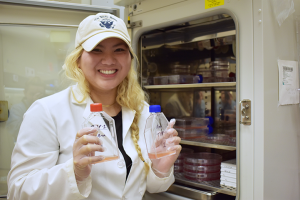 Anastasia Romanov is a second-year master’s student in the Osena lab. She joined the lab in the summer of 2020 to pursue her research interests in biotechnology and molecular biology. Anastasia’s current research focuses on analyzing the antioxidant properties of Eragrostis tef, an ancient crop native to Ethiopia and Eritrea, in human THP-1 monocytes. “Dr. Osena is very passionate about his teaching and his research. I took his plant physiology and biotechnology class in the spring of 2020 and knew that I wanted to work in his lab. Dr. Osena has been an amazing mentor with his guidance, support, and leadership.”
Anastasia Romanov is a second-year master’s student in the Osena lab. She joined the lab in the summer of 2020 to pursue her research interests in biotechnology and molecular biology. Anastasia’s current research focuses on analyzing the antioxidant properties of Eragrostis tef, an ancient crop native to Ethiopia and Eritrea, in human THP-1 monocytes. “Dr. Osena is very passionate about his teaching and his research. I took his plant physiology and biotechnology class in the spring of 2020 and knew that I wanted to work in his lab. Dr. Osena has been an amazing mentor with his guidance, support, and leadership.”